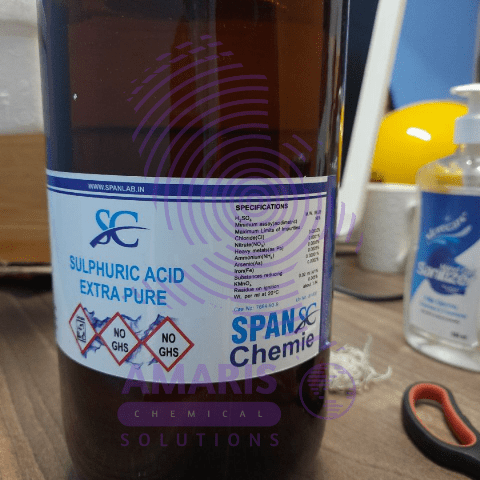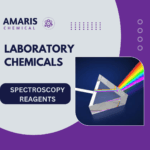The Role of Sulphuric Acid in Industry: Applications and Innovations

Sulphuric acid (H₂SO₄) is one of the most widely used and important chemicals in the global industrial sector. Its versatility and broad range of applications make it a vital component in various manufacturing processes. As the backbone of several industries, sulphuric acid plays a key role in chemical, pharmaceutical, and even agricultural sectors. Let’s explore its primary applications and the innovations surrounding its use.
Applications of Sulphuric Acid
- Fertilizer Production
Sulphuric acid is a key ingredient in the production of phosphate fertilizers. It reacts with phosphate rock to produce phosphoric acid, which is then used to create fertilizers such as superphosphate. These fertilizers are essential for improving soil fertility and enhancing crop yields worldwide. - Petroleum Refining
In petroleum refining, sulphuric acid is used in the alkylation process to produce high-octane gasoline. It helps to remove impurities, ensuring cleaner, more efficient fuel production. - Chemical Synthesis
Sulphuric acid is essential for producing a wide range of chemicals, including detergents, dyes, and pigments. It also plays a role in the manufacture of synthetic materials like plastics and textiles. - Metal Processing
The acid is used to treat metals, especially in processes like pickling and cleaning steel and iron. By removing rust and scale, sulphuric acid helps to improve the quality and longevity of metal products. - Batteries
Sulphuric acid is a key component in lead-acid batteries, commonly found in vehicles and uninterruptible power supplies (UPS). The acid acts as the electrolyte, enabling the chemical reaction that stores energy in the battery.
Innovations in Sulphuric Acid Use
In recent years, innovations have aimed at improving the environmental footprint of sulphuric acid production and utilization. One such advancement is the development of more energy-efficient methods for producing sulphuric acid, reducing greenhouse gas emissions associated with its manufacturing process. Another innovation involves the use of sulphuric acid in green technologies, such as in the production of solar panels and biofuels.
Moreover, research into recycling and reusing sulphuric acid in industrial applications is gaining momentum. This not only helps in conserving resources but also in reducing waste and minimizing environmental impacts.
In conclusion, sulphuric acid continues to be an essential element across numerous industries, from agriculture to energy. As innovations drive its use toward more sustainable and efficient processes, the demand for this versatile acid is likely to remain strong for years to come.


 Emollients
Emollients Humectants
Humectants UV Filters
UV Filters Surfactants (cosmetic)
Surfactants (cosmetic) Preservatives (cosmetic)
Preservatives (cosmetic) Fragrances and Essential Oils
Fragrances and Essential Oils Antioxidants (cosmetics)
Antioxidants (cosmetics)
 Solvents (lab)
Solvents (lab) Chromatography Chemicals
Chromatography Chemicals Microbiology and Cell Culture Reagents
Microbiology and Cell Culture Reagents Biochemical Reagents
Biochemical Reagents Inorganic and Organic Standards
Inorganic and Organic Standards LABORATORY EQUIPMENT & APPARATUS
LABORATORY EQUIPMENT & APPARATUS Spectroscopy Reagents
Spectroscopy Reagents Molecular Biology Reagents
Molecular Biology Reagents
 Precious Metal Extraction Agents
Precious Metal Extraction Agents
 Plasticizers
Plasticizers Polymerization Initiators
Polymerization Initiators Stabilizers
Stabilizers Monomers
Monomers Fillers and Reinforcements
Fillers and Reinforcements Antioxidants (plastics)
Antioxidants (plastics) Colorants (plastic pigments,Dyes)
Colorants (plastic pigments,Dyes)
 Fertilizers
Fertilizers Plant Growth Regulators
Plant Growth Regulators Soil Conditioners
Soil Conditioners Animal Feed Additives
Animal Feed Additives Biostimulants
Biostimulants
 Dough Conditioners
Dough Conditioners Flour Treatments
Flour Treatments Fat Replacers
Fat Replacers Preservatives (baking)
Preservatives (baking)
 Surfactants (cleaning)
Surfactants (cleaning) Builders
Builders Bleaching Agents
Bleaching Agents Enzymes
Enzymes Solvents (cleaning)
Solvents (cleaning) Fragrances
Fragrances Disinfectant
Disinfectant Metal cleaning
Metal cleaning
 Binders/Resins
Binders/Resins Pigments
Pigments Solvents (paint)
Solvents (paint) Additives
Additives Driers
Driers Anti-Corrosion Agents
Anti-Corrosion Agents Specialty Coatings
Specialty Coatings Functional Coatings
Functional Coatings Application-Specific Coatings
Application-Specific Coatings
 Sealants and Adhesives
Sealants and Adhesives
 Biodegradable Surfactants
Biodegradable Surfactants Bio-based Solvents
Bio-based Solvents Renewable Polymers
Renewable Polymers Carbon Capture Chemicals
Carbon Capture Chemicals Wastewater Treatment Chemicals
Wastewater Treatment Chemicals
 Preservatives (food)
Preservatives (food) Flavor Enhancers
Flavor Enhancers Acidulants
Acidulants Sweeteners
Sweeteners Emulsifiers
Emulsifiers Antioxidants (food)
Antioxidants (food) Colorants (food)
Colorants (food) Nutrient Supplements
Nutrient Supplements Nutraceutical Ingredients
Nutraceutical Ingredients
 Fresh Herbs
Fresh Herbs Whole Spices
Whole Spices Ground Spices
Ground Spices Spice Blends
Spice Blends
 Surfactants(oil)
Surfactants(oil)
 Antibiotics
Antibiotics Active Pharmaceutical Ingredients
Active Pharmaceutical Ingredients Excipients
Excipients Vaccine Adjuvants
Vaccine Adjuvants Nutraceutical Ingredients
Nutraceutical Ingredients Solvents (pharmaceutical)
Solvents (pharmaceutical)
 Automotive chemicals
Automotive chemicals Pyrotechnic Chemicals
Pyrotechnic Chemicals


 Vulcanizing Agents
Vulcanizing Agents Accelerators & Retarders
Accelerators & Retarders Antidegradants
Antidegradants Reinforcing Agents
Reinforcing Agents Plasticizers & Softeners
Plasticizers & Softeners Fillers & Extenders
Fillers & Extenders Blowing Agents
Blowing Agents Adhesion Promoters
Adhesion Promoters











